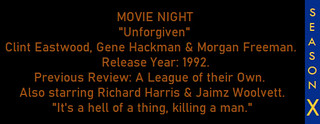 Review #1501: Unforgiven.
Review #1501: Unforgiven.Cast:
Clint Eastwood (William "Will" Munny), Gene Hackman ("Little" Bill Daggett), Morgan Freeman (Ned Logan), Richard Harris (English Bob), Jaimz Woolvett (The Schofield Kid), Saul Rubinek (W. W. Beauchamp), Frances Fisher (Strawberry Alice), Anna Thomson (Delilah Fitzgerald), David Mucci (Quick Mike), Rob Campbell (Davey Bunting), and Anthony James (Skinny Dubois) Produced and Directed by Clint Eastwood (#1252 - Space Cowboys, #1310 - Million Dollar Baby, and #1476 - Pale Rider)
Review:
"Gene Hackman was interesting because I gave the Unforgiven script to his agent and he said no, he didn't want to do anything violent. But I went back to him and said, "I know where you're coming from. You get to a certain age and I'm there too, where you don't want to tell a lot of violent stories, but this is a chance to make a great statement"
It's easy to make a lasting great Western when it is going to be the last one you make after a long career defined by them. Eastwood had at least one defining Western that he was featured in, whether that involved television with Rawhide or with films such as A Fistful of Dollars, Two Mules for Sister Sara, or Pale Rider. This was his 17th directorial effort (and fourth involving the Western), and it surely proved a fitting last hurrah for Eastwood to declare as his last Western so as to not repeat himself or others (which has proven correct in for over two decades). The script for this film was written by David Peoples (who prior to writing had been a editor for TV and news programs) in 1976, with one development title being "The William Munny Killings", and one inspiration for him when it came to the depiction of violence was Taxi Driver. The script languished for years while Peoples wrote for other films such as The Day After Trinity (1980) and Blade Runner (1982), with Eastwood having waited around for years to do other projects first. Eastwood thought of making changes to the script, but he changed his mind because of how he saw the script was better without it (minus one thing, which involved having the opening having a text crawl rather than a voiceover). The result was two Academy Awards for Eastwood (for direction and Best Picture) and one for Hackman alongside one for editing.
At last, a Western great enough for the 1990s to deserve. It proves to be a riveting and somber ilm with its subversion of the Western and the myths that could make outlaws famous with whatever exploit could be covered fast enough. Sure, there have been quite a few films that have played with the clichés and traditions of what we saw in the Western in the classic era (with one slight resemblance being The Shootist, for example), but this one handles itself with a great elegiac quality in its direction, characters, and pace that make it one for the ages. It lives and moves with a great patience for making its surroundings resonate with its audience, with a false note never happening as more characters come and leave the picture as reflections of the time and place, whether that means a once-removed killer/farmer, or a savage outlaw, an outlaw with publicity, or even a sight-challenged kid with reputation. The easiest strength of the film lies within its main trio of actors, starting with Eastwood. No one ever fit the mythic mold of the Western hero ever so much in the last few decades of the 20th century film era like Eastwood did, who resonates in pained grit that reflects past and present with no contrived frills as a man with shades of gray. Hackman proves just as worthy in matching up to Hackman on the other side of the hill, tenacious and dedicated in intimidation and order (one of the people Hackman drew from was a police chief, for example) that lend excellence to small moments, such as a conversation with Harris and Rubinek involving the nature of fact and fiction with outlaws turning into a quiet showdown of chicken. Freeman (in the midst of a deserved rise in prominence with supporting and lead roles in the late 1980s) fills in the main details with resonating nerve and conviction that we come to depend on in a careful balancing act between him and Eastwood that make for useful time spent. Harris, despite being in the film considerably less than the others (and only having time with just Hackman and Rubinek) does a resoundingly good job in playing the part of the myth of a refined killer come out splendidly when faced with Hackman and his own interpretation of killers and those who write about them. Woolvett is the key supporting piece to encapsulate the film, brash but quite convincing as the lasting piece of the dealings of myth and reality when it comes to bits of amusement and action between him and Eastwood, never grating on one's patience. Rubinek and the others prove well in filling the town with interest and the dealings that come with conflicting view of justice and morality. What we have here is a film to stamp out the myths that came from films about a time as myth-inducing as the Old West with a wise one at the hand behind and in front of the camera in Eastwood to do wonders with for 131 minutes. This is a well-done piece of subversion and execution on a variety of levels that range from its cast to its look (done entirely in Alberta, Canada) that make the grand myth of outlaw one to look closer into and care about with flourish and satisfaction. It isn't the first Western one might view for themselves, but it sure is the one deserving of being up there to see time and time again among the classics.
Overall, I give it 10 out of 10 stars.

No comments:
Post a Comment